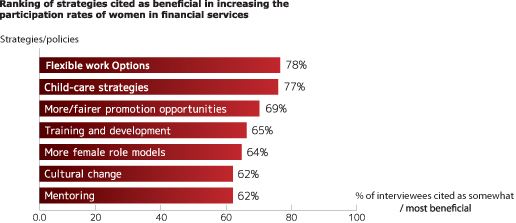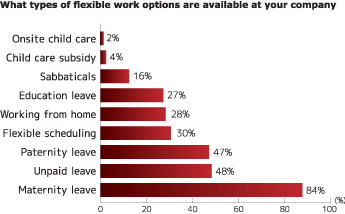
Over half of surveyed finance professionals in Greater China agree there is a gender income gap in the financial services industry according to a recent survey from eFinancialCareers. Results were based on a sample of 1,355 finance professionals employed in accounting, compliance/legal, corporate finance, equity capital markets and investment banking. The overall study comprised 54% male respondents and 46% female, from Hong Kong and China, Singapore and Australia.
It was also discovered that the gap widens as professionals climb the career ladder. One in five respondents believe that remuneration is not equal for men and women in entry level positions, while more than half believe that inequality exists in top managerial positions. Yet, according to Kay McArdle, Board Chair of The Women’s Foundation—a not-for-profit organisation dedicated to improving the lives of women and girls in Hong Kong, “A company which has some women in its highest leadership ranks will have higher earnings per share, a greater return on equity and higher stock prices than competitors with fewer or no senior female leaders.”
Second top in the proposed strategies was provision of child-care. McArdle pointed to the success of the day care centres provided in many European companies. In Norway the cost of parenting leave is split evenly between the employing organisations of the mother and the father, allowing true parity on both sides of the parenting equation.
McArdle demonstrated the glaring gender gap in senior roles at a recent Hong Kong press conference by highlighting the USD1.9 trillion global hedge fund industry—a market familiar to much of the local audience, where women manage only 3% of hedge fund assets, only 10% of regional funds and are employed in only 9% of senior management roles.
Over four in ten respondents believe that being male makes it easier to succeed in the finance industry, and almost four in ten believe they have been discriminated against or are aware of others having been discriminated against due to gender, at some stage. The survey attempts to make sense of this gender disparity. It was revealed that well over half of all respondents believe that men are more likely to put themselves forward for promotion opportunities.
Men, it seems, still strive harder to advance their careers because they continue to carry the ‘greater half’ of the family’s financial burden. Yet gender equality amounts to equal rights, opportunities and obligations in all areas of life. If the playing field were even, men and women would be empowered to take equal responsibility for matters outside and within the workplace. Indeed, only 32% believe there is an explicit gender diversity programme in their organisation and 27% did not know such a programme existed.
According to McArdle, HR’s role is to bridge this expectation gap by implementing policies to make equality reality and at the same time offer the added advantage of developing female talent to the same extent they that they do for men. Respondents cited various potential strategies as beneficial in increasing the participation rates of women in financial services, of which an overwhelming 78% of interviewees listed flexible scheduling. It was discovered that only 30% of organisations in the financial sector actually offer this facility against a national average of 85%, 57% in and 50% of organisations generally in Australia, China and Singapore, respectively.
Paternity leave is yet to exist in Hong Kong compared with up to 18 weeks in Australia and a maximum of 20 weeks in the UK. Even the average maternity leave, of 10 weeks at 80% of full salary, lags behind the global average of the top ten developed nations which stands at 13 weeks at full pay. In a region where high turnover remains a key concern, perhaps HR is missing an invaluable trick by not taking the necessary steps to retain its female workers.
Second top in the proposed strategies was provision of child-care. McArdle pointed to the success of the day care centres provided in many European companies. In Norway the cost of parenting leave is split evenly between the employing organisations of the mother and the father, allowing true parity on both sides of the parenting equation.Paternity leave is yet to exist in Hong Kong compared with up to 18 weeks in Australia and a maximum of 20 weeks in the UK. Even the average maternity leave, of 10 weeks at 80% of full salary, lags behind the global average of the top ten developed nations which stands at 13 weeks at full pay. In a region where high turnover remains a key concern, perhaps HR is missing an invaluable trick by not taking the necessary steps to retain its female workers.




